|
|
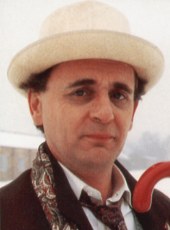 |
|
The
Seventh Doctor
(1987 - 1996) |
|
|
|
|
|
|
The
Sound Vault |
|
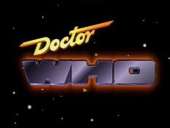 |
|
 |
|
| Ace |
|
|
The Best Doctor
|
| |
| Vote
if I am your favourite Doctor |
|
|
|
|
|
 In
many ways, the Seventh Doctor is the Doctor that changed the
most over the course of his life. When he began his travels
through time and space, he appeared to be an almost clown-like
figure, demonstrating a certain resemblance to his second incarnation
due to his relatively short stature and his slightly jocular
personality, as well as his slight uncertainty about his own
identity; when selecting his clothing he initially tried on
variations of the clothes worn by his fourth, third and fifth
incarnations before settling on his own attire, and even after
that he made various subtle changes to his clothing as time
went on, ranging from changing from a cream jacket to a brown
one to switching from a question-mark-covered sleeveless pullover
to a blood-red waistcoat (Although this last was worn for only
a brief period at the end of his life). In
many ways, the Seventh Doctor is the Doctor that changed the
most over the course of his life. When he began his travels
through time and space, he appeared to be an almost clown-like
figure, demonstrating a certain resemblance to his second incarnation
due to his relatively short stature and his slightly jocular
personality, as well as his slight uncertainty about his own
identity; when selecting his clothing he initially tried on
variations of the clothes worn by his fourth, third and fifth
incarnations before settling on his own attire, and even after
that he made various subtle changes to his clothing as time
went on, ranging from changing from a cream jacket to a brown
one to switching from a question-mark-covered sleeveless pullover
to a blood-red waistcoat (Although this last was worn for only
a brief period at the end of his life).
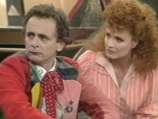 |
| Time and the Rani |
|
 This
Doctor’s apparently
developing personality was reflected in his early days by his
apparent habit of making his plans
up as he went along while relying on the skills of others to
bring events to a satisfactory conclusion, such as when he recruited
the inhabitants of Paradise Towers to defeat the insane ‘Great
Architect’ ("Paradise
Towers") or relied on
the various skills of his new friends - including a beekeeper,
a couple of mechanics, a holiday camp owner, and a couple of
American secret service agents - to avert the Bannermens’ attempts
to destroy the Chimmerons ("Delta
and the Bannermen").
During this time period, The Doctor also demonstrated a rather
friendly, relaxed persona, casually showing a couple of relative
strangers around the TARDIS - albeit to convince them that he
was telling the truth about an alien presence - and playing
the spoons in the Intergalactic Song Contest - performing in
front of billions of people - to buy his associates time to
disarm a bomb that had been hidden inside the original performer
("Bang-Bang-A-Boom!"). This incarnation’s short
stature and habit for attempting to take his companion Mel on
holidays further reinforced this seemingly casual attitude towards
the universe, his only bleak moment at this time being a trip
to Pompeii where he believed that he would lose the TARDIS after
witnessing its discovery in an archaeological dig in the future
(Only to work out a loophole at the last minute that allowed
him to retain the TARDIS while leaving history unchanged) ("The
Fires of Vulcan"); he was once even forced into helping
a couple of soldiers attempt to change their planet’s
history, creating two alternate timelines that were apparently
stuck in a loop (The Doctor’s actions to change one history
created the other, forcing its inhabitants to make The Doctor
take them back and restore the other timeline, resulting in
inhabitants of the ‘original’ timeline forcing this
timeline’s Doctor to take them back…) ("Flip-Flop"). This
Doctor’s apparently
developing personality was reflected in his early days by his
apparent habit of making his plans
up as he went along while relying on the skills of others to
bring events to a satisfactory conclusion, such as when he recruited
the inhabitants of Paradise Towers to defeat the insane ‘Great
Architect’ ("Paradise
Towers") or relied on
the various skills of his new friends - including a beekeeper,
a couple of mechanics, a holiday camp owner, and a couple of
American secret service agents - to avert the Bannermens’ attempts
to destroy the Chimmerons ("Delta
and the Bannermen").
During this time period, The Doctor also demonstrated a rather
friendly, relaxed persona, casually showing a couple of relative
strangers around the TARDIS - albeit to convince them that he
was telling the truth about an alien presence - and playing
the spoons in the Intergalactic Song Contest - performing in
front of billions of people - to buy his associates time to
disarm a bomb that had been hidden inside the original performer
("Bang-Bang-A-Boom!"). This incarnation’s short
stature and habit for attempting to take his companion Mel on
holidays further reinforced this seemingly casual attitude towards
the universe, his only bleak moment at this time being a trip
to Pompeii where he believed that he would lose the TARDIS after
witnessing its discovery in an archaeological dig in the future
(Only to work out a loophole at the last minute that allowed
him to retain the TARDIS while leaving history unchanged) ("The
Fires of Vulcan"); he was once even forced into helping
a couple of soldiers attempt to change their planet’s
history, creating two alternate timelines that were apparently
stuck in a loop (The Doctor’s actions to change one history
created the other, forcing its inhabitants to make The Doctor
take them back and restore the other timeline, resulting in
inhabitants of the ‘original’ timeline forcing this
timeline’s Doctor to take them back…) ("Flip-Flop").
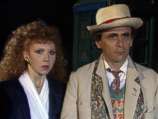 |
| Delta and the Bannermen |
|
 As
time went on, however, The Doctor became more obviously intellectual
and increasingly darker in personality, known for manipulating
even his companions when the situation called for it, treating
his companions and the people they met more like chess pieces
in an elaborate game rather than the individuals he had once
valued so highly. Indeed, during the events of "Head
Games",
it was revealed that he had actually deliberately influenced
his sixth incarnation’s old companion Melanie
Bush to
leave him ("Dragonfire") so that he could continue
his new role as ‘Time’s Champion’ without
her morality holding him back. On a later occasion he also influenced
his companion Ace to leave him ("Love
and War") so
that she could later return and help him eliminate a virus that
had infected the TARDIS ("Deceit"),
having previously taken her back to a mansion that had given
her nightmares as
a child - driving her to blow up the house when she was thirteen
- simply to satisfy his own curiosity ("Ghost
Light"),
later casually describing her as an emotional cripple and little
more than a pawn in his plans (Albeit as part of a scheme to
stop the nigh-omnipotent evil known as Fenric) ("The
Curse of Fenric"). He even lied to his companions about such
details as why he was visiting particular locations, such as
when he took Benny,
Chris and Roz to
the realm of the People ("The
Also People") - a race so powerful that they
had a non-aggression pact with the Time Lords - claiming that
he had taken them there for a holiday when in reality he was
tracking renegade time traveller Kadiatu Lethbridge-Stewart
(First encountered in "Transit"), a genetically-engineered
adopted by the descendents of his old friend The Brigadier and
apparently ‘evolved’ by Earth in response to The
Doctor’s interference in the planet’s history, although
she went on to become an ally and aid to The Doctor after he
had treated the damage done to her DNA. On one occasion The
Doctor’s guilt over this attitude towards his companions
drove him to try and slip away alone while various past friends
and companions were attending Benny’s wedding, but Benny
stopped him from leaving by convincing him that he didn’t
deserve to be alone ("Happy
Endings"). His skills of
manipulation were hinted at by the skills in sleight-of-hand
that he demonstrated on several occasions, most notably when
keeping the powerful Gods of Ragnarok occupied with magic tricks
while Ace disposed of an amulet that they needed to control
their power ("The
Greatest Show in the Galaxy"), as
well as more practical uses, such as stealing and altering the
forged identity papers of renegade time-traveller Klein without
her noticing ("Colditz"). As
time went on, however, The Doctor became more obviously intellectual
and increasingly darker in personality, known for manipulating
even his companions when the situation called for it, treating
his companions and the people they met more like chess pieces
in an elaborate game rather than the individuals he had once
valued so highly. Indeed, during the events of "Head
Games",
it was revealed that he had actually deliberately influenced
his sixth incarnation’s old companion Melanie
Bush to
leave him ("Dragonfire") so that he could continue
his new role as ‘Time’s Champion’ without
her morality holding him back. On a later occasion he also influenced
his companion Ace to leave him ("Love
and War") so
that she could later return and help him eliminate a virus that
had infected the TARDIS ("Deceit"),
having previously taken her back to a mansion that had given
her nightmares as
a child - driving her to blow up the house when she was thirteen
- simply to satisfy his own curiosity ("Ghost
Light"),
later casually describing her as an emotional cripple and little
more than a pawn in his plans (Albeit as part of a scheme to
stop the nigh-omnipotent evil known as Fenric) ("The
Curse of Fenric"). He even lied to his companions about such
details as why he was visiting particular locations, such as
when he took Benny,
Chris and Roz to
the realm of the People ("The
Also People") - a race so powerful that they
had a non-aggression pact with the Time Lords - claiming that
he had taken them there for a holiday when in reality he was
tracking renegade time traveller Kadiatu Lethbridge-Stewart
(First encountered in "Transit"), a genetically-engineered
adopted by the descendents of his old friend The Brigadier and
apparently ‘evolved’ by Earth in response to The
Doctor’s interference in the planet’s history, although
she went on to become an ally and aid to The Doctor after he
had treated the damage done to her DNA. On one occasion The
Doctor’s guilt over this attitude towards his companions
drove him to try and slip away alone while various past friends
and companions were attending Benny’s wedding, but Benny
stopped him from leaving by convincing him that he didn’t
deserve to be alone ("Happy
Endings"). His skills of
manipulation were hinted at by the skills in sleight-of-hand
that he demonstrated on several occasions, most notably when
keeping the powerful Gods of Ragnarok occupied with magic tricks
while Ace disposed of an amulet that they needed to control
their power ("The
Greatest Show in the Galaxy"), as
well as more practical uses, such as stealing and altering the
forged identity papers of renegade time-traveller Klein without
her noticing ("Colditz").
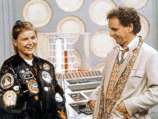 |
| Dragonfire |
|
 His
actions on a larger scale further reinforced his darker nature
in contrast to other Doctors. While his past selves would only
kill their enemies if they were certain that no other option
was available, this Doctor was not only far more willing to
kill - albeit by arranging large-scale traps rather than taking
direct physical action himself - but was even known to allow
innocents to die in the name of a greater cause, such as when
he destroyed a planet (Although the planet in question was Skaro,
homeworld of the Daleks, and The Doctor only destroyed it after
giving Davros all due warning about the potential consequences)
("Remembrance
of the Daleks"), a whole galaxy ("The
Pit"), and an entire alternate timeline ("Blood
Heat"),
as well as condemning a civilisation to the loss of its main
source of power ("Head Games"), in the name of the ‘greater
good’ (Although in all cases the destruction had to take
place to either end a serious threat to reality and to ensure
that history remained on its proper course). He even proved
willing to make more morally compromising personal decisions
than his previous selves, aiding in Hitler’s rise to power
while tracking the time-altering Timewyrm ("Timewyrm:
Exodus"),
officially joining the Nazi party in order to destroy a Nazi
superweapon he had unintentionally inspired ("Just
War"),
arranging the destruction of a laboratory to eliminate a genetically
engineered race known as the Kiseibyaa that had been created
to destroy the Daleks (Reflecting that he had once had the chance
to do the same to the Daleks ("Genesis
of the Daleks")
and had refused to take action at the time) ("Enemy
of the Daleks"), and damaging the journalistic reputation
of his old companion Sarah
Jane Smith in order to protect her
from a ruthless Japanese triad ("Bullet
Time"). However,
his manipulations did not always result in destruction; one
notable example of this was when he returned to Peladon, a world
that he had become fond of in his third incarnation, manipulating
events to convince Peladon to temporarily withdraw from the
Galactic Federation to ensure that it would be kept out of an
upcoming war with the Daleks ("Legacy"). His
actions on a larger scale further reinforced his darker nature
in contrast to other Doctors. While his past selves would only
kill their enemies if they were certain that no other option
was available, this Doctor was not only far more willing to
kill - albeit by arranging large-scale traps rather than taking
direct physical action himself - but was even known to allow
innocents to die in the name of a greater cause, such as when
he destroyed a planet (Although the planet in question was Skaro,
homeworld of the Daleks, and The Doctor only destroyed it after
giving Davros all due warning about the potential consequences)
("Remembrance
of the Daleks"), a whole galaxy ("The
Pit"), and an entire alternate timeline ("Blood
Heat"),
as well as condemning a civilisation to the loss of its main
source of power ("Head Games"), in the name of the ‘greater
good’ (Although in all cases the destruction had to take
place to either end a serious threat to reality and to ensure
that history remained on its proper course). He even proved
willing to make more morally compromising personal decisions
than his previous selves, aiding in Hitler’s rise to power
while tracking the time-altering Timewyrm ("Timewyrm:
Exodus"),
officially joining the Nazi party in order to destroy a Nazi
superweapon he had unintentionally inspired ("Just
War"),
arranging the destruction of a laboratory to eliminate a genetically
engineered race known as the Kiseibyaa that had been created
to destroy the Daleks (Reflecting that he had once had the chance
to do the same to the Daleks ("Genesis
of the Daleks")
and had refused to take action at the time) ("Enemy
of the Daleks"), and damaging the journalistic reputation
of his old companion Sarah
Jane Smith in order to protect her
from a ruthless Japanese triad ("Bullet
Time"). However,
his manipulations did not always result in destruction; one
notable example of this was when he returned to Peladon, a world
that he had become fond of in his third incarnation, manipulating
events to convince Peladon to temporarily withdraw from the
Galactic Federation to ensure that it would be kept out of an
upcoming war with the Daleks ("Legacy").
 This
need to put the big picture over the desires of his fellow travellers
was reflected by his current choice in companions. Even in the Third
Doctor’s days with UNIT, when working as their scientific
advisor, he regularly encouraged his military allies not to
kill, whereas the Seventh often took advantage of his companions’ military-related
abilities and knowledge of conflict, even if he still encouraged
them to find other ways of solving their problems. While Mel
- who had travelled with his previous self - was particularly
non-violent, preferring to go on various holidays with The Doctor
rather than face monsters - although she still stood by him
in times of crisis - her immediate successor Ace demonstrated
a keen expertise for devising explosives, later going on to
become a hardened veteran of the Dalek war after spending three
years away from The Doctor after he apparently allowed a young
man she had developed feelings for to die simply because he
was jealous ("Love and War" and "Deceit").
His companion Bernice
Summerfield ("Love and War") marked a shift from this approach, as she disdained her past military training as a conscript during the Dalek Wars in exchange for a focus on her research skills as an archaeologist, although she was still more capable than Ace of understanding some of the moral compromises The Doctor had to make at times. Later companions Chris Cwej and Roz Forrester ("Original
Sin") continued this trend of The Doctor selecting
companions capable of resorting to more permanent measures than
he himself might rely on, as both were experienced Adjudicators
used to using force to solve their problems, although Chris
in particular displayed a less violent side as time went on
and he spent more time with The Doctor. The Doctor’s darker nature was particularly reflected during a meeting with his fifth incarnation ("Cold
Fusion"), the Seventh referring to the Fifth as ‘bland’ when asking Adric which Doctor he was travelling with - referring to his fourth self as ‘boggle’- and later saying that the Fifth
Doctor wasn’t even one of his ‘good’ incarnations in their final confrontation with the ruthless Feratu, inhabitants of an alternate timeline who sought to ensure the creation of their world by destroying Gallifrey in the distant past, only for the Seventh Doctor to manipulate events to destroy their universe (An action that left the Fifth Doctor appalled at this vision of his future). When an attack by the ruthless Word Lord resulted in two different versions of the Seventh Doctor being present at the same time, with the younger Doctor dying to destroy the Word Lord ("A Death in the Family"), the paradoxical future Seventh Doctor took Ace and Hex to different locations while claiming that he intended to set them up for a peaceful life after his death as there was nothing he could do about his changed past at that time. However, when Ace and Hex realised that they could set up a chain of events that would restore The Doctor to existence, they were each left wondering if the future Doctor had really been trying to help them or just wanted to save their lives, although they concluded in the end that all that mattered was that the Word Lord had been defeated and The Doctor was restored. However, he still respected some of his past selves; when a visit to a museum inspired him to go back and offer some advice to his second incarnation, the Seventh Doctor simply told the Second that he should sometimes plan things out more rather than relying on chance as often as he did, encouraging the younger Doctor to do things a different way without dismissing his usual methods the way he had the Fifth’s ("The
Colony of Lies"). This
need to put the big picture over the desires of his fellow travellers
was reflected by his current choice in companions. Even in the Third
Doctor’s days with UNIT, when working as their scientific
advisor, he regularly encouraged his military allies not to
kill, whereas the Seventh often took advantage of his companions’ military-related
abilities and knowledge of conflict, even if he still encouraged
them to find other ways of solving their problems. While Mel
- who had travelled with his previous self - was particularly
non-violent, preferring to go on various holidays with The Doctor
rather than face monsters - although she still stood by him
in times of crisis - her immediate successor Ace demonstrated
a keen expertise for devising explosives, later going on to
become a hardened veteran of the Dalek war after spending three
years away from The Doctor after he apparently allowed a young
man she had developed feelings for to die simply because he
was jealous ("Love and War" and "Deceit").
His companion Bernice
Summerfield ("Love and War") marked a shift from this approach, as she disdained her past military training as a conscript during the Dalek Wars in exchange for a focus on her research skills as an archaeologist, although she was still more capable than Ace of understanding some of the moral compromises The Doctor had to make at times. Later companions Chris Cwej and Roz Forrester ("Original
Sin") continued this trend of The Doctor selecting
companions capable of resorting to more permanent measures than
he himself might rely on, as both were experienced Adjudicators
used to using force to solve their problems, although Chris
in particular displayed a less violent side as time went on
and he spent more time with The Doctor. The Doctor’s darker nature was particularly reflected during a meeting with his fifth incarnation ("Cold
Fusion"), the Seventh referring to the Fifth as ‘bland’ when asking Adric which Doctor he was travelling with - referring to his fourth self as ‘boggle’- and later saying that the Fifth
Doctor wasn’t even one of his ‘good’ incarnations in their final confrontation with the ruthless Feratu, inhabitants of an alternate timeline who sought to ensure the creation of their world by destroying Gallifrey in the distant past, only for the Seventh Doctor to manipulate events to destroy their universe (An action that left the Fifth Doctor appalled at this vision of his future). When an attack by the ruthless Word Lord resulted in two different versions of the Seventh Doctor being present at the same time, with the younger Doctor dying to destroy the Word Lord ("A Death in the Family"), the paradoxical future Seventh Doctor took Ace and Hex to different locations while claiming that he intended to set them up for a peaceful life after his death as there was nothing he could do about his changed past at that time. However, when Ace and Hex realised that they could set up a chain of events that would restore The Doctor to existence, they were each left wondering if the future Doctor had really been trying to help them or just wanted to save their lives, although they concluded in the end that all that mattered was that the Word Lord had been defeated and The Doctor was restored. However, he still respected some of his past selves; when a visit to a museum inspired him to go back and offer some advice to his second incarnation, the Seventh Doctor simply told the Second that he should sometimes plan things out more rather than relying on chance as often as he did, encouraging the younger Doctor to do things a different way without dismissing his usual methods the way he had the Fifth’s ("The
Colony of Lies").
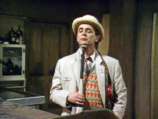 |
| Remembrance of the Daleks |
|
 Despite
his darker persona, The Doctor’s rejection of violence
remained perhaps particularly strong in this incarnation, only
resorting to direct physical violence on extreme occasions,
such as when he was engaged in a final showdown with The
Valeyard,
his own dark side, on top of an old church in 1888 ("Matrix").
On at least two occasions The Doctor walked away unharmed from
face-to-face confrontation with armed enemies by actually challenging
them to shoot him, forcing them to recognise the scale of what
they would do if they killed him ("The
Happiness Patrol" and "Colditz").
This rejection of violence was also demonstrated in his last
televised appearance as he confronted The Master; even when ‘contaminated’ by
the ferality-inducing planet of the Cheetah People, The Doctor
refused to resort to physical violence against his enemy, loudly
proclaiming ‘If we fight like animals, we’ll die
like animals!’ ("Survival"). On some occasions
he used particularly alien abilities against his foes, once
rendering Mordred unconscious simply by pressing his fingers
against Mordred’s forehead ("Battlefield").
Even when he briefly turned himself into a human - apparently
in order to better relate to his companion Benny’s grief
over the death of a man she loved ("Sanctuary") -
The Doctor’s human identity of John Smith refused to resort
to the use of weapons even when he himself was uncertain whether
he was truly John Smith or The Doctor, demonstrating his strong
opposition to violence ("Human
Nature"). He was also
known for more than once talking his opponents to defeat, essentially
ordering a Black Dalek to self-destruct as he informed it that
it was the last of its kind ("Remembrance of the Daleks"),
convincing the powerful being known as Light to destroy himself
by showing him that his attempt to catalogue all forms of life
would never be complete ("Ghost Light"), even talking
a Nazi officer into committing suicide ("Just War"),
while on another occasion he convinced Hitler to expel the powerful
entity known as the Timewyrm from himself by convincing Hitler
it was useless when in reality the Timeywrm was all that kept
Hitler stable in the early days of the war ("Timewyrm:
Exodus"). Despite
his darker persona, The Doctor’s rejection of violence
remained perhaps particularly strong in this incarnation, only
resorting to direct physical violence on extreme occasions,
such as when he was engaged in a final showdown with The
Valeyard,
his own dark side, on top of an old church in 1888 ("Matrix").
On at least two occasions The Doctor walked away unharmed from
face-to-face confrontation with armed enemies by actually challenging
them to shoot him, forcing them to recognise the scale of what
they would do if they killed him ("The
Happiness Patrol" and "Colditz").
This rejection of violence was also demonstrated in his last
televised appearance as he confronted The Master; even when ‘contaminated’ by
the ferality-inducing planet of the Cheetah People, The Doctor
refused to resort to physical violence against his enemy, loudly
proclaiming ‘If we fight like animals, we’ll die
like animals!’ ("Survival"). On some occasions
he used particularly alien abilities against his foes, once
rendering Mordred unconscious simply by pressing his fingers
against Mordred’s forehead ("Battlefield").
Even when he briefly turned himself into a human - apparently
in order to better relate to his companion Benny’s grief
over the death of a man she loved ("Sanctuary") -
The Doctor’s human identity of John Smith refused to resort
to the use of weapons even when he himself was uncertain whether
he was truly John Smith or The Doctor, demonstrating his strong
opposition to violence ("Human
Nature"). He was also
known for more than once talking his opponents to defeat, essentially
ordering a Black Dalek to self-destruct as he informed it that
it was the last of its kind ("Remembrance of the Daleks"),
convincing the powerful being known as Light to destroy himself
by showing him that his attempt to catalogue all forms of life
would never be complete ("Ghost Light"), even talking
a Nazi officer into committing suicide ("Just War"),
while on another occasion he convinced Hitler to expel the powerful
entity known as the Timewyrm from himself by convincing Hitler
it was useless when in reality the Timeywrm was all that kept
Hitler stable in the early days of the war ("Timewyrm:
Exodus").
 Although
he could be cold towards his companions at times, his compassion
for them nevertheless remained, The Doctor demonstrating evident
grief when he witnessed The Brigadier nearly die in his attempts
to help The Doctor ("Battlefield"); indeed, on two
occasions - "No
Future" and "Happy Endings" - The
Brigadier genuinely perished and was only saved thanks to
time being altered by outside influences, both occasions causing
The Doctor great pain before his friend was restored. When a temporal accident resulted in the Fifth and Seventh Doctors materialising on the same planet at the same time ("Cold Fusion"), although the Seventh Doctor was dismissive of his past self, he was clearly grateful for the chance to see Adric again, Roz reflecting that the Seventh Doctor treated Adric like a grandfather doting on a grandson. Even when
he was forced to abuse her faith in him to prevail against the
ruthless Fenric, The Doctor clearly regretted his actions towards
Ace and regularly displayed a genuine affection for her, many
fans regarding his bond with her as more of a father/daughter
relationship than the typical Doctor/companion dynamic. When The Doctor was forced to work with his predecessor's
companion Evelyn Smythe ("The Marian Conspiracy" to "Thicker Than Water") to defeat the villain the Word Lord, Evelyn criticised The Doctor's new willingness to lie to his companions and manipulate others to suit his own ends, as well as warning him about what he was turning his young companions into, but The Doctor countered that his predecessor's habit of improvising at short notice had led to further problems, citing such examples as his history with the Forge ("Project: Twilight" and "Project: Lazarus"). Despite this, when Evelyn died to take the Word Lord with her, she died thinking warmly of her travels with the Sixth Doctor, and the Seventh Doctor spoke at her funeral, praising his friendship with her. After Ace moved on, The Doctor
also
developed a strong friendship with archaeologist Bernice ‘Benny’ Summerfield,
describing her on one occasion as one of his longest-running
companions and inspiring her to take a job at the Braxiatel
Collection - a collection of various historical artefacts run
by Time Lord Irving Braxiatel, rumoured by some to be The Doctor’s
brother - after her departure and divorce ("Eternity
Weeps"),
which allowed her to continue helping others using the methods
she had learned from The Doctor. Although not as obviously close,
he also formed a strong bond with Chris Cwej, at one point asking
Chris to replace him when he contemplated allowing himself to
die out of guilt at his actions in this life ("The
Room With No Doors"), Chris later becoming a ‘guardian’ of
The Doctor’s older memories when the TARDIS transferred
them to Chris’s subconscious to help its owner ("Lungbarrow").
In the latter days of his life, he was also profoundly affected
by the deaths of present and former companions Roz Forrester
("So
Vile a Sin") and Liz Shaw ("Eternity
Weeps"),
Liz’s death being particularly hard for The Doctor when
he and Chris only realised that she had provided them with information
that could have saved her when it was too late for them to use
it. Although
he could be cold towards his companions at times, his compassion
for them nevertheless remained, The Doctor demonstrating evident
grief when he witnessed The Brigadier nearly die in his attempts
to help The Doctor ("Battlefield"); indeed, on two
occasions - "No
Future" and "Happy Endings" - The
Brigadier genuinely perished and was only saved thanks to
time being altered by outside influences, both occasions causing
The Doctor great pain before his friend was restored. When a temporal accident resulted in the Fifth and Seventh Doctors materialising on the same planet at the same time ("Cold Fusion"), although the Seventh Doctor was dismissive of his past self, he was clearly grateful for the chance to see Adric again, Roz reflecting that the Seventh Doctor treated Adric like a grandfather doting on a grandson. Even when
he was forced to abuse her faith in him to prevail against the
ruthless Fenric, The Doctor clearly regretted his actions towards
Ace and regularly displayed a genuine affection for her, many
fans regarding his bond with her as more of a father/daughter
relationship than the typical Doctor/companion dynamic. When The Doctor was forced to work with his predecessor's
companion Evelyn Smythe ("The Marian Conspiracy" to "Thicker Than Water") to defeat the villain the Word Lord, Evelyn criticised The Doctor's new willingness to lie to his companions and manipulate others to suit his own ends, as well as warning him about what he was turning his young companions into, but The Doctor countered that his predecessor's habit of improvising at short notice had led to further problems, citing such examples as his history with the Forge ("Project: Twilight" and "Project: Lazarus"). Despite this, when Evelyn died to take the Word Lord with her, she died thinking warmly of her travels with the Sixth Doctor, and the Seventh Doctor spoke at her funeral, praising his friendship with her. After Ace moved on, The Doctor
also
developed a strong friendship with archaeologist Bernice ‘Benny’ Summerfield,
describing her on one occasion as one of his longest-running
companions and inspiring her to take a job at the Braxiatel
Collection - a collection of various historical artefacts run
by Time Lord Irving Braxiatel, rumoured by some to be The Doctor’s
brother - after her departure and divorce ("Eternity
Weeps"),
which allowed her to continue helping others using the methods
she had learned from The Doctor. Although not as obviously close,
he also formed a strong bond with Chris Cwej, at one point asking
Chris to replace him when he contemplated allowing himself to
die out of guilt at his actions in this life ("The
Room With No Doors"), Chris later becoming a ‘guardian’ of
The Doctor’s older memories when the TARDIS transferred
them to Chris’s subconscious to help its owner ("Lungbarrow").
In the latter days of his life, he was also profoundly affected
by the deaths of present and former companions Roz Forrester
("So
Vile a Sin") and Liz Shaw ("Eternity
Weeps"),
Liz’s death being particularly hard for The Doctor when
he and Chris only realised that she had provided them with information
that could have saved her when it was too late for them to use
it.
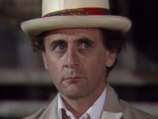 |
| Silver Nemesis |
|
 This
Doctor is also remembered for the air of mystery that constantly
surrounded his actions. While other Doctors either avoided discussing
their pasts - particularly the First
Doctor - or simply shared
the occasional story without discussing anything explicit such
as names or family members - the Third Doctor, particularly
with the tales of his visit to an old monk who lived in the
hills behind his house - the Seventh Doctor almost deliberately
cultivated an air of mystery, showing relative strangers around
the TARDIS while simultaneously dropping hints that he might
have developed the Hand of Omega at the dawn of Gallifreyian
civilisation ("Remembrance of the Daleks") and ‘provoking’ Ace
to ask him ‘Who are you?’ after Lady Peinforte
hinted that he was more than a Time Lord just so that he could
refuse
to answer ("Silver
Nemesis"). Later on, however, it
was suggested that not even he was consciously aware of his
connection to Gallifrey’s past, such as when a collision
with an old Gallifreyian time capsule gave him a chance to briefly
speak with the Pythia - last of the old rulers of Gallifrey
before Rassilon - leaving The Doctor with a unique chance to
gain answers about his questions regarding Ancient Gallifrey,
although he was forced to end the questioning in order to prevent
the Pythia from learning too much about her future ("Cat's
Cradle: Time's Crucible"). An investigation into
the mystery of the Seven Planets - worlds which mysterious vanished
at some point in the 25th century - resulted in The Doctor learning
from an ancient Gallifreyian general that early Gallifreyian
time-travel experiments tore holes in the fabric of reality,
allowing beings such as the Great Vampires to gain access to
this plane of existence ("The Pit"). A later trip
to the twentieth century resulted in them dealing with the activation
of an ancient Gallifreyian weapon called an N-Form being activated
partially by the psychic bond between twins who had been separated
at birth ("Damaged
Goods"), while a later fight pitted
The Doctor against the representation of the irrationality that
the Time Lords had banished from the universe, The Doctor vowing
to defeat it as otherwise the sacrifices of those who had died
in his travels would become pointless ("Christmas
on a Rational Planet"), each case featuring The Doctor showing
some awareness of Gallifrey’s past without even entirely
certain how he knew it. This
Doctor is also remembered for the air of mystery that constantly
surrounded his actions. While other Doctors either avoided discussing
their pasts - particularly the First
Doctor - or simply shared
the occasional story without discussing anything explicit such
as names or family members - the Third Doctor, particularly
with the tales of his visit to an old monk who lived in the
hills behind his house - the Seventh Doctor almost deliberately
cultivated an air of mystery, showing relative strangers around
the TARDIS while simultaneously dropping hints that he might
have developed the Hand of Omega at the dawn of Gallifreyian
civilisation ("Remembrance of the Daleks") and ‘provoking’ Ace
to ask him ‘Who are you?’ after Lady Peinforte
hinted that he was more than a Time Lord just so that he could
refuse
to answer ("Silver
Nemesis"). Later on, however, it
was suggested that not even he was consciously aware of his
connection to Gallifrey’s past, such as when a collision
with an old Gallifreyian time capsule gave him a chance to briefly
speak with the Pythia - last of the old rulers of Gallifrey
before Rassilon - leaving The Doctor with a unique chance to
gain answers about his questions regarding Ancient Gallifrey,
although he was forced to end the questioning in order to prevent
the Pythia from learning too much about her future ("Cat's
Cradle: Time's Crucible"). An investigation into
the mystery of the Seven Planets - worlds which mysterious vanished
at some point in the 25th century - resulted in The Doctor learning
from an ancient Gallifreyian general that early Gallifreyian
time-travel experiments tore holes in the fabric of reality,
allowing beings such as the Great Vampires to gain access to
this plane of existence ("The Pit"). A later trip
to the twentieth century resulted in them dealing with the activation
of an ancient Gallifreyian weapon called an N-Form being activated
partially by the psychic bond between twins who had been separated
at birth ("Damaged
Goods"), while a later fight pitted
The Doctor against the representation of the irrationality that
the Time Lords had banished from the universe, The Doctor vowing
to defeat it as otherwise the sacrifices of those who had died
in his travels would become pointless ("Christmas
on a Rational Planet"), each case featuring The Doctor showing
some awareness of Gallifrey’s past without even entirely
certain how he knew it.
 As
well as exploring the mysteries of Gallifrey’s past, this
Doctor also found himself facing the return of some old foes
from both his own past and the distant beginnings of history
itself, facing various challenges from all corners of the universe.
The most personal of these was the Timewyrm, a powerful time-manipulating
entity that was unintentionally created when The Doctor gave
a ruthless cyborg access to the TARDIS’s secondary console
("Timewyrm:
Genesys"), although another interesting
encounter saw him pitted against two men who personified the
universe’s pain at the histories that were erased by the
actions of time travellers ("Falls
The Shadow"). One
of the most personal returning enemies he faced at this time
was his first incarnation’s old friend-turned-foe the Meddling
Monk, a Time Lord who had initially sought to ‘improve’ history,
driven nearly insane at the idea that he was seen as the villain
for simply wanting to improve history while The Doctor was a
hero for meddling everywhere he went and attempting to gain
revenge on The Doctor, only to be defeated by Ace when she overcame
her current issues with The Doctor ("No
Future").
He was also briefly reunited with the Second
Doctor’s
foe the War
Chief when tracking the Timewyrm, attempting to
continue the program he began in the War Games by using the
Nazi soldiers, but he was apparently killed in an explosion
("Timewyrm: Exodus"). An intriguing long-term enemy
at this point was the Brotherhood, a group of human psychics
who attempted to gather human psis together at various points
across human history, their earliest recorded encounter being
in 1799 ("Christmas on a Rational Planet") and ending
with the Brotherhood’s attempt to use old Gallifreyian
technology to trigger psychic powers in all of humanity during
a revolution for control of the Earth Empire ("So Vile
a Sin"). As
well as exploring the mysteries of Gallifrey’s past, this
Doctor also found himself facing the return of some old foes
from both his own past and the distant beginnings of history
itself, facing various challenges from all corners of the universe.
The most personal of these was the Timewyrm, a powerful time-manipulating
entity that was unintentionally created when The Doctor gave
a ruthless cyborg access to the TARDIS’s secondary console
("Timewyrm:
Genesys"), although another interesting
encounter saw him pitted against two men who personified the
universe’s pain at the histories that were erased by the
actions of time travellers ("Falls
The Shadow"). One
of the most personal returning enemies he faced at this time
was his first incarnation’s old friend-turned-foe the Meddling
Monk, a Time Lord who had initially sought to ‘improve’ history,
driven nearly insane at the idea that he was seen as the villain
for simply wanting to improve history while The Doctor was a
hero for meddling everywhere he went and attempting to gain
revenge on The Doctor, only to be defeated by Ace when she overcame
her current issues with The Doctor ("No
Future").
He was also briefly reunited with the Second
Doctor’s
foe the War
Chief when tracking the Timewyrm, attempting to
continue the program he began in the War Games by using the
Nazi soldiers, but he was apparently killed in an explosion
("Timewyrm: Exodus"). An intriguing long-term enemy
at this point was the Brotherhood, a group of human psychics
who attempted to gather human psis together at various points
across human history, their earliest recorded encounter being
in 1799 ("Christmas on a Rational Planet") and ending
with the Brotherhood’s attempt to use old Gallifreyian
technology to trigger psychic powers in all of humanity during
a revolution for control of the Earth Empire ("So Vile
a Sin").
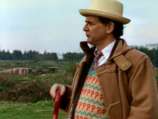 |
| The Curse of Fenric |
|
 In
keeping with his new title as ‘Time’s Champion’,
and the status this gave him among higher beings, this Doctor
also had regular dealings with the personification of Death,
once making a deal with Death to give her one of his lives to
save his companion Ace ("Love and War"), this deal
being fulfilled with the ‘death’ of his human identity
Doctor John Smith ("Human Nature"). On another occasion
The Doctor made a deal with Death to free The Master from his
role as Death’s Champion for a decade, allowing him to
live the life he would have lived, in exchange for The Doctor
killing The Master at the conclusion of that time, but he was
unable to complete the deal in the end, leaving The Doctor with
increased guilt after he was made aware that a deal he made
with Death as a child was the reason for The Master’s
current life (Although the ‘good’ Master forgave
The Doctor for his youthful mistake) ("Master").
Another adventure saw him engaging in a rematch with his old
enemy The
Toymaker ("The
Magic Mousetrap"), revealed in a previous
confrontation to be the Guardian of Dreams (Although the evidence
suggests that, for The Toymaker, this encounter took place before
The Doctor’s past encounters with him). In
keeping with his new title as ‘Time’s Champion’,
and the status this gave him among higher beings, this Doctor
also had regular dealings with the personification of Death,
once making a deal with Death to give her one of his lives to
save his companion Ace ("Love and War"), this deal
being fulfilled with the ‘death’ of his human identity
Doctor John Smith ("Human Nature"). On another occasion
The Doctor made a deal with Death to free The Master from his
role as Death’s Champion for a decade, allowing him to
live the life he would have lived, in exchange for The Doctor
killing The Master at the conclusion of that time, but he was
unable to complete the deal in the end, leaving The Doctor with
increased guilt after he was made aware that a deal he made
with Death as a child was the reason for The Master’s
current life (Although the ‘good’ Master forgave
The Doctor for his youthful mistake) ("Master").
Another adventure saw him engaging in a rematch with his old
enemy The
Toymaker ("The
Magic Mousetrap"), revealed in a previous
confrontation to be the Guardian of Dreams (Although the evidence
suggests that, for The Toymaker, this encounter took place before
The Doctor’s past encounters with him).
 In
many ways, however, it was his deal with Time to become Time’s
Champion that left The Doctor most troubled, his guilt over
the actions he had to commit to fulfil his duty made even worse
by the ‘memory’ of his sixth incarnation. As the Sixth
Doctor in his mind resented the Seventh for cutting his
life short to become Time’s Champion, while the Seventh
gradually came to associate his previous self with the Valeyard
due to that incarnation’s innate hubris, the Sixth Doctor’s
mental representation in his mind became increasingly twisted
to the point where The Doctor kept his sixth self permanently
locked in his subconscious out of fear of what he might become,
the Sixth Doctor even transforming into the Valeyard when The
Doctor was exposed to residual energies from the Land of Fiction that caused his guilt to physically manifest as his previous
self ("Head Games"). Increasingly doubting his worth
and abilities as the universe’s defender after he was
forced to sacrifice a significant portion of Earth’s population
to save the rest of the planet from a virulent airborne toxin
("Eternity Weeps"), The Doctor nearly allowed himself
to die after he was shot by an arrow during a war in sixteenth
century Japan ("The Room With No Doors"), believing
that this was the only way to prevent his sixth self’s
memory being used to create the Valeyard. However, after waking
up in his own coffin when he was shot with an arrow while saving
a child, he recognised that he was The Doctor no matter which
incarnation he was in, leading to him forgiving himself for
his past sins and removing the guilt that had so mutilated his
memory of his previous self, thus ‘curing’ the Sixth
Doctor’s memory of the ‘taint’ that would
have resulted in the memory of that incarnation being used to
create the Valeyard. In
many ways, however, it was his deal with Time to become Time’s
Champion that left The Doctor most troubled, his guilt over
the actions he had to commit to fulfil his duty made even worse
by the ‘memory’ of his sixth incarnation. As the Sixth
Doctor in his mind resented the Seventh for cutting his
life short to become Time’s Champion, while the Seventh
gradually came to associate his previous self with the Valeyard
due to that incarnation’s innate hubris, the Sixth Doctor’s
mental representation in his mind became increasingly twisted
to the point where The Doctor kept his sixth self permanently
locked in his subconscious out of fear of what he might become,
the Sixth Doctor even transforming into the Valeyard when The
Doctor was exposed to residual energies from the Land of Fiction that caused his guilt to physically manifest as his previous
self ("Head Games"). Increasingly doubting his worth
and abilities as the universe’s defender after he was
forced to sacrifice a significant portion of Earth’s population
to save the rest of the planet from a virulent airborne toxin
("Eternity Weeps"), The Doctor nearly allowed himself
to die after he was shot by an arrow during a war in sixteenth
century Japan ("The Room With No Doors"), believing
that this was the only way to prevent his sixth self’s
memory being used to create the Valeyard. However, after waking
up in his own coffin when he was shot with an arrow while saving
a child, he recognised that he was The Doctor no matter which
incarnation he was in, leading to him forgiving himself for
his past sins and removing the guilt that had so mutilated his
memory of his previous self, thus ‘curing’ the Sixth
Doctor’s memory of the ‘taint’ that would
have resulted in the memory of that incarnation being used to
create the Valeyard.
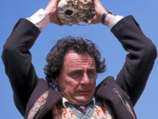 |
| Survival |
|
 However,
even with his personal issues resolved, towards the end of The
Doctor’s life, he faced his most challenging confrontation;
six hundred and seventy-three years after he first left Gallifrey,
The Doctor at last returned to his family House of Lungbarrow,
where he learned that his Cousins had been trapped inside the
House when it sank into the ground on the day he left, Quences
- the head of the House - having been murdered… by a man
who Chris, who witnessed the murder in a telepathic vision he
experienced after being ‘attacked’ by the dust in
the House, identified as the First Doctor, the situation made
even more complex as the Celestial Intervention Agency attempted
to interrogate his old companions for information about him.
Despite facing the rejection and suspicion of his family, The
Doctor was nevertheless aided by his old companies Leela, Romana,
Dorothee and Chris, who travelled into his mind to learn the
truth about the secrets that were being sought by the other
Time Lords, discovering evidence that The Doctor was actually
the ‘reincarnation’ of the Other, the third of the
three founders of Time Lord society - the other two being Rassilon and Omega - who had sacrificed himself to protest against Rassilon’s
brutal regime by throwing himself into the genetic looms created
to escape the ancient curse of sterility, later being apparently
reborn as The Doctor. Although shocked at this latest revelation
about his past, The Doctor nevertheless resolved to move past
that period of his life, recognising that it didn’t matter
who he’d been and the only thing that mattered now was
his identity as The Doctor, trusting his old companions to keep
his secrets. He also managed to clear his name of Quences’ murder,
learning that Glospin - his old childhood rival - had used a
sample of his DNA to forcibly regenerate himself into the physical
double of the First Doctor, murdering Quences and then regenerating
again after the murder to conceal his guilt. With his family
freed - although The Doctor declined to become the new Head
of the House - The Doctor departed from Gallifrey once more,
having been assigned by Romana the task of collecting The Master’s
remains from Skaro after his execution by the Daleks ("Lungbarrow"). However,
even with his personal issues resolved, towards the end of The
Doctor’s life, he faced his most challenging confrontation;
six hundred and seventy-three years after he first left Gallifrey,
The Doctor at last returned to his family House of Lungbarrow,
where he learned that his Cousins had been trapped inside the
House when it sank into the ground on the day he left, Quences
- the head of the House - having been murdered… by a man
who Chris, who witnessed the murder in a telepathic vision he
experienced after being ‘attacked’ by the dust in
the House, identified as the First Doctor, the situation made
even more complex as the Celestial Intervention Agency attempted
to interrogate his old companions for information about him.
Despite facing the rejection and suspicion of his family, The
Doctor was nevertheless aided by his old companies Leela, Romana,
Dorothee and Chris, who travelled into his mind to learn the
truth about the secrets that were being sought by the other
Time Lords, discovering evidence that The Doctor was actually
the ‘reincarnation’ of the Other, the third of the
three founders of Time Lord society - the other two being Rassilon and Omega - who had sacrificed himself to protest against Rassilon’s
brutal regime by throwing himself into the genetic looms created
to escape the ancient curse of sterility, later being apparently
reborn as The Doctor. Although shocked at this latest revelation
about his past, The Doctor nevertheless resolved to move past
that period of his life, recognising that it didn’t matter
who he’d been and the only thing that mattered now was
his identity as The Doctor, trusting his old companions to keep
his secrets. He also managed to clear his name of Quences’ murder,
learning that Glospin - his old childhood rival - had used a
sample of his DNA to forcibly regenerate himself into the physical
double of the First Doctor, murdering Quences and then regenerating
again after the murder to conceal his guilt. With his family
freed - although The Doctor declined to become the new Head
of the House - The Doctor departed from Gallifrey once more,
having been assigned by Romana the task of collecting The Master’s
remains from Skaro after his execution by the Daleks ("Lungbarrow").
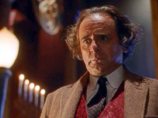 |
| Doctor Who: The Movie |
|
 Travelling alone for a time before he attended to this new mission, the Seventh Doctor mellowed significantly, initially appearing to forsake his role as Timeís Champion. Although he
retained his old cunning, he now tended to resort to less manipulative
means of dealing with his enemies, showing an increased awareness
of others and a greater desire to find a solution that would
result in the least amount of death. He once willingly spent years as a prisoner of the Daleks to develop a virus that would
defeat their attempt to master the Spiridons’ secret of
invisibility rather than take a quicker solution that would
have put his current allies at risk ("Return
of the Daleks"). He also showed more obvious regret when he failed in this goal, such as when he was forced to destroy a ship belonging to Vilgreth,
a being who had been recreated from the DNA of the Titanthropes
- evolutionary offshoots of the Neanderthals - who didn’t
understand the damage he was causing to other planets ("Last
of the Titans"). However, this lack of his old sense of control could often work against him, such as his final trip to the planet Artaris and the city-state of Excelis, which saw his old foe the immortal Warlord
Grayvorn destroy the entire world in revenge for The Doctor thwarting his plans ("Excelis
Decays"). The Seventh Doctor's new reluctance was best demonstrated
in a meeting with his fifth and sixth selves where he proved
unwilling to allow the legendary time beast the Temperon to
sacrifice itself to stop the ruthless Sirens of Time even after
it expressed its willingness to do so, the Sixth Doctor releasing
the Temperon instead ("The Sirens of Time"). When
a later adventure saw him once again dealing with Elizabeth
Klein - a Nazi scientist from an alternate version of 1965 where
the Nazis won the war whose attempts to capture him in 1944
erased her history ("Colditz") -, The Doctor actually
attempted to give her a chance to reform by inviting her to
travel with him rather than simply taking her to a prison where
she could do no harm, hoping that he could open her mind to
new ideas beyond her Nazi perceptions ("A
Thousand Tiny Wings"), although he was finally forced to erase her from
history after she stole the TARDIS and created a Reich that
lasted until 2044 ("The
Architects of History "), The
Doctor evidently mourning the necessity of that choice no matter
how clear it had become that Klein would never abandon her goal. Seeking further attempts to escape his bloody past, The Doctor even attempted to make a deal with Death herself to release The Master from her hold over him so that he could live a peaceful life for ten years on the condition that The Doctor would kill The Master at the end of that decade (The Doctor most likely trying to exploit the fact that he only knew of The Master's death without knowing the specifics of it), but in that final meeting The Doctor was unable to bring himself to kill the kind 'Doctor John Smith', allowing Death to manipulate Smith into becoming The Master once again ("Master"). Travelling alone for a time before he attended to this new mission, the Seventh Doctor mellowed significantly, initially appearing to forsake his role as Timeís Champion. Although he
retained his old cunning, he now tended to resort to less manipulative
means of dealing with his enemies, showing an increased awareness
of others and a greater desire to find a solution that would
result in the least amount of death. He once willingly spent years as a prisoner of the Daleks to develop a virus that would
defeat their attempt to master the Spiridons’ secret of
invisibility rather than take a quicker solution that would
have put his current allies at risk ("Return
of the Daleks"). He also showed more obvious regret when he failed in this goal, such as when he was forced to destroy a ship belonging to Vilgreth,
a being who had been recreated from the DNA of the Titanthropes
- evolutionary offshoots of the Neanderthals - who didn’t
understand the damage he was causing to other planets ("Last
of the Titans"). However, this lack of his old sense of control could often work against him, such as his final trip to the planet Artaris and the city-state of Excelis, which saw his old foe the immortal Warlord
Grayvorn destroy the entire world in revenge for The Doctor thwarting his plans ("Excelis
Decays"). The Seventh Doctor's new reluctance was best demonstrated
in a meeting with his fifth and sixth selves where he proved
unwilling to allow the legendary time beast the Temperon to
sacrifice itself to stop the ruthless Sirens of Time even after
it expressed its willingness to do so, the Sixth Doctor releasing
the Temperon instead ("The Sirens of Time"). When
a later adventure saw him once again dealing with Elizabeth
Klein - a Nazi scientist from an alternate version of 1965 where
the Nazis won the war whose attempts to capture him in 1944
erased her history ("Colditz") -, The Doctor actually
attempted to give her a chance to reform by inviting her to
travel with him rather than simply taking her to a prison where
she could do no harm, hoping that he could open her mind to
new ideas beyond her Nazi perceptions ("A
Thousand Tiny Wings"), although he was finally forced to erase her from
history after she stole the TARDIS and created a Reich that
lasted until 2044 ("The
Architects of History "), The
Doctor evidently mourning the necessity of that choice no matter
how clear it had become that Klein would never abandon her goal. Seeking further attempts to escape his bloody past, The Doctor even attempted to make a deal with Death herself to release The Master from her hold over him so that he could live a peaceful life for ten years on the condition that The Doctor would kill The Master at the end of that decade (The Doctor most likely trying to exploit the fact that he only knew of The Master's death without knowing the specifics of it), but in that final meeting The Doctor was unable to bring himself to kill the kind 'Doctor John Smith', allowing Death to manipulate Smith into becoming The Master once again ("Master").
 |
Dark Universe
(Guy Adams) |
|
 However, as The Doctor's travels continued, he began to demonstrate a renewed awareness of the necessity of his current incarnation's role as Time's Champion. Becoming aware that his own 'death' was imminent, The Doctor began to actively seek out threats to the universe, even setting up a complex surveillance network to help him identify and eliminate particular threats, concerned that his successor would be less equipped to deal with such dangers ("Persuasion"). A particular crisis at this point in his life saw him working with the version of Klein that existed in the prime universe and a man who claimed to be his own future self, The Doctor joining them and UNIT in dealing with various cross-dimensional incursions, but this collaboration ended when it was revealed that the 'other' Doctor was in fact a future incarnation of The Master, attempting to charge up dimension-manipulating technology to persuade another species to become his own private army, although The Doctor was quickly able to convince The Master's would-be allies to stand down. Having made a degree of peace with Klein, The Doctor would recruit her and her assistant, Will Arrowsmith, as his new companions when tracking former Nazi scientist Kurt Schalk, whose brain had been imprinted by higher beings with instructions on the creation of the Persuasion Machine, a dangerous device that could make anyone believe the orders that were programmed into it, forcing the new TARDIS crew to fend off the Sontarans, the Daleks, and even the entities that gave Schalk the original instructions before all trace of the Persuasion Machine was destroyed ("Starlight Robbery" and "Daleks
Among Us"). Another encounter with The Master pitted The Doctor against the unique threat of two Masters in one place as the universe collapsed around them due to a complex paradox created by The Cult of the Heretic, a group dedicated to a renegade Time Lord who sought to unmake the universe, although The Doctor was able to use the Cult's equipment to reset reality and undo the original paradox ("The Two Masters").
At one point, The Doctor became so bitter at the state of the universe that he allowed himself to fall under the influence of the Dark Citizens, reality-warping Time Lords from another dimension ("Dark Universe"), using their power to rewrite reality in his own universe, making himself Lord President of a Gallifrey that took a more active role in the universe at the cost of depriving the general population of their freedoms ("The Last Day"). Fortunately, his companions in this incarnation were brought together by Ace (whose constant contact with Time Lords gave her some protection from the subsequent ripple even as an alternate version of her took charge of Earth on The Doctorís behalf), allowing Ace to find the version of The Doctor from the Dark Universe and bring him to this reality. With his other self to force The Doctor to face the scale of his actions, The Doctor rejected the Dark Citizensí attempts to force him to kill his companions (particularly after the resurrected Roz sacrificed herself again to remind The Doctor of what he was doing) and ordered them to return to their universe, undoing their actions on The Doctorís behalf. However, as The Doctor's travels continued, he began to demonstrate a renewed awareness of the necessity of his current incarnation's role as Time's Champion. Becoming aware that his own 'death' was imminent, The Doctor began to actively seek out threats to the universe, even setting up a complex surveillance network to help him identify and eliminate particular threats, concerned that his successor would be less equipped to deal with such dangers ("Persuasion"). A particular crisis at this point in his life saw him working with the version of Klein that existed in the prime universe and a man who claimed to be his own future self, The Doctor joining them and UNIT in dealing with various cross-dimensional incursions, but this collaboration ended when it was revealed that the 'other' Doctor was in fact a future incarnation of The Master, attempting to charge up dimension-manipulating technology to persuade another species to become his own private army, although The Doctor was quickly able to convince The Master's would-be allies to stand down. Having made a degree of peace with Klein, The Doctor would recruit her and her assistant, Will Arrowsmith, as his new companions when tracking former Nazi scientist Kurt Schalk, whose brain had been imprinted by higher beings with instructions on the creation of the Persuasion Machine, a dangerous device that could make anyone believe the orders that were programmed into it, forcing the new TARDIS crew to fend off the Sontarans, the Daleks, and even the entities that gave Schalk the original instructions before all trace of the Persuasion Machine was destroyed ("Starlight Robbery" and "Daleks
Among Us"). Another encounter with The Master pitted The Doctor against the unique threat of two Masters in one place as the universe collapsed around them due to a complex paradox created by The Cult of the Heretic, a group dedicated to a renegade Time Lord who sought to unmake the universe, although The Doctor was able to use the Cult's equipment to reset reality and undo the original paradox ("The Two Masters").
At one point, The Doctor became so bitter at the state of the universe that he allowed himself to fall under the influence of the Dark Citizens, reality-warping Time Lords from another dimension ("Dark Universe"), using their power to rewrite reality in his own universe, making himself Lord President of a Gallifrey that took a more active role in the universe at the cost of depriving the general population of their freedoms ("The Last Day"). Fortunately, his companions in this incarnation were brought together by Ace (whose constant contact with Time Lords gave her some protection from the subsequent ripple even as an alternate version of her took charge of Earth on The Doctorís behalf), allowing Ace to find the version of The Doctor from the Dark Universe and bring him to this reality. With his other self to force The Doctor to face the scale of his actions, The Doctor rejected the Dark Citizensí attempts to force him to kill his companions (particularly after the resurrected Roz sacrificed herself again to remind The Doctor of what he was doing) and ordered them to return to their universe, undoing their actions on The Doctorís behalf.
 |
The Last Day
(Matt Fitton and Guy Adams) |
|
 When The Doctor finally retrieved The Masterís remains from Skaro, The Master managed to escape his ‘death’,
reanimating himself in the form of a ‘deathworm’ which
had absorbed his intelligence after his physical demise, disrupting
the TARDIS’s systems and forcing it to make an emergency
landing in San Francisco on December 30th 1999. As The Doctor
stepped out of the TARDIS into the middle of a gang shooting,
he was shot by a gang who had been about to kill a young man
called Chang Lee, who had been standing just behind the location
where the TARDIS materialised. Although the bullets were safely
extracted, The Doctor’s unusual physiology prompted the
doctors treating him to conclude that there was something wrong
with his heart, resulting in them attempting to operate on him.
The resulting anaesthetic, combined with the surgeons’ ‘ineptitude’,
resulted in The Doctor dying on the table, alone and surrounded
by well-meaning strangers who could do nothing to help him -
as had been ‘foretold’ by a young woman who had
been trapped in a ghost-like state after becoming unstuck in
time ("Return
of the Living Dad") and promised by
Death for the times he had cheated her ("So Vile a Sin")
Due to the anaesthetic interfering with the normally automatic regenerative process, the Seventh Doctor remained 'dead' for several hours before he finally regenerated into his eighth incarnation, a poor fate for a Doctor who had faced challenges and tasks that previous Doctors would have hesitated to resort to in order to preserve the universe that he had left Gallifrey to explore and protect so many centuries ago. When The Doctor finally retrieved The Masterís remains from Skaro, The Master managed to escape his ‘death’,
reanimating himself in the form of a ‘deathworm’ which
had absorbed his intelligence after his physical demise, disrupting
the TARDIS’s systems and forcing it to make an emergency
landing in San Francisco on December 30th 1999. As The Doctor
stepped out of the TARDIS into the middle of a gang shooting,
he was shot by a gang who had been about to kill a young man
called Chang Lee, who had been standing just behind the location
where the TARDIS materialised. Although the bullets were safely
extracted, The Doctor’s unusual physiology prompted the
doctors treating him to conclude that there was something wrong
with his heart, resulting in them attempting to operate on him.
The resulting anaesthetic, combined with the surgeons’ ‘ineptitude’,
resulted in The Doctor dying on the table, alone and surrounded
by well-meaning strangers who could do nothing to help him -
as had been ‘foretold’ by a young woman who had
been trapped in a ghost-like state after becoming unstuck in
time ("Return
of the Living Dad") and promised by
Death for the times he had cheated her ("So Vile a Sin")
Due to the anaesthetic interfering with the normally automatic regenerative process, the Seventh Doctor remained 'dead' for several hours before he finally regenerated into his eighth incarnation, a poor fate for a Doctor who had faced challenges and tasks that previous Doctors would have hesitated to resort to in order to preserve the universe that he had left Gallifrey to explore and protect so many centuries ago.
 Although he only ever did what he had to do, and came to accept the necessity of his actions, the Seventh Doctor has generally been poorly regarded by his other selves. When the First Doctor once found himself needing to reach out to his future incarnations for help dealing with a complex situation involving a golden bow and arrow, he deliberately avoided calling his seventh self for help ("Short Trips: Zodiac - Five Card Draw") as he was uncomfortable with what he saw of his future. During a conversation with his companion Lucie Miller ("Deimos" and "The Resurrection of Mars"), the Eighth Doctor unfavourably compared his immediate predecessor to the Meddling Monk, stating that they were both 'men with a plan' that focused on their perception of the 'greater good' while ignoring the innocent people caught up in their plans, even if the Seventh Doctor never deliberately sought to sacrifice innocents and generally acted to preserve history where the Monk would set up any amount of death if it would lead to what he thought would be 'good' results later. Although he only ever did what he had to do, and came to accept the necessity of his actions, the Seventh Doctor has generally been poorly regarded by his other selves. When the First Doctor once found himself needing to reach out to his future incarnations for help dealing with a complex situation involving a golden bow and arrow, he deliberately avoided calling his seventh self for help ("Short Trips: Zodiac - Five Card Draw") as he was uncomfortable with what he saw of his future. During a conversation with his companion Lucie Miller ("Deimos" and "The Resurrection of Mars"), the Eighth Doctor unfavourably compared his immediate predecessor to the Meddling Monk, stating that they were both 'men with a plan' that focused on their perception of the 'greater good' while ignoring the innocent people caught up in their plans, even if the Seventh Doctor never deliberately sought to sacrifice innocents and generally acted to preserve history where the Monk would set up any amount of death if it would lead to what he thought would be 'good' results later.
|